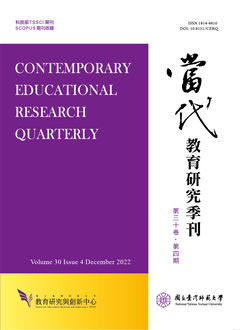

本文旨在探討開展授業研究的文化因素,透過人種誌的研究方 法探究日本文化對實施授業研究的影響。雖然許多研究表明,日本的 授業研究能有效地促進教師合作、建立專業學習社群,並提高學生的 學習水平,但是卻未能在其他國家植根。本研究以野中郁次郎和竹內 弘高的 SECI(socialization-externalization-combination-internalization) 知識創造模型作為理論框架,分析授業研究的機制,並採用人種誌 的研究方法在名古屋與愛知縣進行研究,探究日本文化對實施授業 研究的影響。研究發現高度信任的日本社會文化,教師的專業自主 問責制,以及追求「改善」的常規行為(Kaizen Kata)是培植日本授 業研究的重要元素。其他國家的學校系統可以透過建立組織學習文 化培植這些元素。
關鍵詞:授業研究、SECI 模型、知識創造、組織學習文化
Through conducting an ethnography study to explore the influence of Japanese culture on the implementation of Lesson Study, this paper aims to explore the culture factors for developing Lesson Study. Despite many studies indicate that Japanese Lesson Study can effectively facilitate teacher collaboration, develop professional learning communities and enhance student learning performance, it cannot be deeply rooted in other countries. This study adopts Nonaka and Takeuchi’s SECI (socialization-externalization-combination– internalization) knowledge creation model as the theoretical framework to analyze the mechanism of Lesson Study, and conducted ethnographic studies in Nagoya and Aichi Prefecture to explore the influence of Japanese culture on the implementation of Lesson Study. Results of this study show that a high-trust culture in the Japanese society, a strong professional accountability of teacher, and a unique culture of Kaizen Kata for pursuing improvement are the critical elements for cultivating Japanese Lesson Study. School systems in other countries may cultivate these elements through developing an organizational learning culture to institutionalize Lesson Study. Keywords: Lesson Study, SECI model, Knowledge creation, Organizational learning culture

本著作係採用創用 CC 姓名標示-非商業性 3.0 台灣 授權條款授權.
本刊國立台灣師範大學教育研究與創新中心
106台北市和平東路一段162號 | 電話: 02-7749-3670 | E-mail: cerecerq@gmail.com
教創中心 | 師大 | 電子報 | 線上投審系統
本刊由國家科學及技術委員會人文社會科學研究中心補助經費
© 2014 CERI-NTNU
